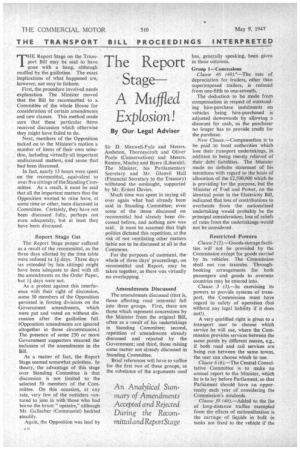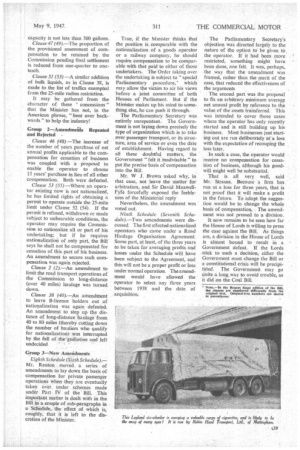The Report
Page 46

Page 49

If you've noticed an error in this article please click here to report it so we can fix it.
Stage—
A Muffled Explosion!
By Our. Legal Adviser
THE Report Stage on the Transport Bill may be said to have gone with a bang, although muffled by the guillotine. The exact implications of what happened are, however, not easy to fathom.
First, the procedure involved needs explanation. The Minister moved that the Bill be recommitted to a Committee of the whole House for consideration of certain amendments and new clauses. This method made • sure that these particular items received discussion which otherwise they might have failed to do.
Next, members of the Opposition tacked on to the Minister's motion a number of items of their own selection, including virtually all important undiscussed matters, and some that had been discussed.
In fact, nearly 13 hours were spent on the recommittal, equivalent to over five sittings of the Standing Committee As a result, it must be said that all the important matters that the Opposition wanted to raise have, at some time or other, been discussed in Committee. Certainly, they have not been discussed fully, perhaps not even adequately,, but at least they have been discussed.
Report Stage Cut The Report Stage proper suffered as a result of the recommittal, as the three days allotted by the time table were reduced to I I days. Three days (as extended 'by, late sittings) might have been adequate to deal with all the amendments on the Order Paper, but I days were not.
As a protest against this interference with their right of discussion, some 30 members of the Opposition persisted in forcing divisions on the Government amendments, which were put and voted on without discussion after the guillotine fell. (Opposition amendments are ignored altogether in those circumstances.) The presence of some 250 or more Government supporters ensured the inclusion of the amendments in the. Bill.
As a matter of fact, the Report Stage seemed somewhat pointless. In theory, • the advantage of this stage over Standing Committee is that discussion is not limited to the selected 50 members of the Committee. On this occasion, at any rate, very few of the outsiders ventured to join in with 'those who had borne the brunt "upstairs," although Mr. Gallacher (Communist) heckled steadily Again, the Opposition was lead by Sir D. Maxwell-Fyfe and Messrs. Assheton, Thorneycroft and Oliver Poole (Conservatives) and Messrs. Renton, Maclay and Byers (Liberals). The Minister, his Parliamentary Secretary and Mr. Glenvil Hall (Financial Secretary to the Treasury) withstood the onslaught, supported by Mr. Ernest Davies.
Much time was spent in saying all over again what had already been said in Standing Committee; even some of the items discussed on recommittal had already been discussed before, and nothing new, was said. It must be assumed that high • politics dictated this repetition, at the risk of not ventilating other matters liable not to be discussed at all in the Commons.
For the purposes of comment, the whole of three days' proceedings, on recommittal and Report, may be taken together, as there was virtually no overlapping.
.Amendments Discussed
The amendments discussed (that is, those affecting road interests) fall into three groups. First, there are those which represent concessions by the Minister from the original Bill, often as a result of his undertakings in Standing Committee; Second, repetition of amendments already discussed and rejected by the Government; and third, those raising some matter not already discussed in Standing Committee.
Brief references will have to suffice for the first two of these groups, as the substance of the arguments used has, generally speaking, been given in these columns.
Group 1—Concessions Clause 46 (48).*—The rate ' of depreciation for -trailers, other than superimposed trailers, is reduced from one-fifth to one-seventh.
The deduction to be made from compensation in respect of outstanding hire-purchase instalments on vehicles being hire-purchased is adjusted downwards by allowing a discount for cash, as the purchaser no longer has to provide credit for the purchase.
New Clause.—Compensation is to be paid to local authorities which lose their transport undertakings, in addition to being merely relieved of their debt liabilities. The Minister made no definite statement of his intentions with regard to the basis of
• allocation of the .£2,500,000 which he is providing for the purpose, but the Minister of Fuel and Power, on the identical point in the Electricity Bill, indicated that loss of contributions to overheads from the nationalized undertaking would probably be the• principal consideration; loss of reliefs of rafes from the undertakings would not be considered,
Restricted Powers Clause 2 (2).—Goods-storage facilities will not be provided by the Commission except for goods carried by its vehicles. The Commission shall not run taxicabs. Throughbooking arrangements for both passengers and goods to overseas countries may be entered into.
Clause 3 (3).—In exercising its powers to provide systems of transport, the Commission must have regard to safety of operation (but without any legal liability if it does not!).
A very qualified right is given to a transport user to choose which service he will use, where the Commission provides services between the same points by different means, e.g., if both road and rail services are being run between the same towns, the user can choose which to use.
Clause 6 (6).---The Central Consultative Committee is to make an annual report to the Minister, which he is to lay before Parliament, so that Parliament should have an opportunity each year of considering the Commission's misdeeds.
Clause 38 (40).—Added to the list of long-distance traffics exempted from the effects of nationalization is the carriage of liquids in bulk in tanks not fixed to the vehicle if the capacity is not less than 500 gallons_ Clause 47 (49).—The proportion of the provisional assessment of compensation to be retained by the Commission pending final settlement is reduced from one-quarter to onetenth.
Clause 51 (53)—A similar addition of bulk liquids, as in Clause 38, is made to the list of traffics exempted from the 25-mile radius restriction.
It may be gathered from the character of these concessions" that the Minister has not, in the American phrase, "bent over backwards" to help the industry!
Group 2—Amendmeas Repeated and Rejected • Clause 46 (48)—The increase of the number of years purchase of net annual profits applicable to the compensation for cessation of business was coupled with a proposal to enable the operator to choose 15 years' purchase in lieu of all other compensation. Both were defeated.
Clause 53 (55) —Where an operator existing now is not nationalized, he has limited rights of obtaining a permit to operate outside the 25-mile limit under Clause 52 (54). If the permit is refused, withdrawn or made subject to unbearable conditions, the operator may require the Commission to nationalize all or part of his undertaking; but if he requires nationalization of only part, the Bill says he shall not be compensated for cessation of this part of his business. An amendment to secure such compensation was again rejected.
Clause 2 (2).—An amendment to limit the road transport operations of the Commission to long-distance (over 40 miles) haulage was turned down_ Clause 38 (40).—An amendment to leave B-licence holders out of nationalization was again defeated. An amendment to step up the distance of long-distance haulage from 40 to 80 miles (thereby cutting down the number of hauliers who qualify for nationalization) was interrupted by the fall of the guillotine and left undecided Group 3—New Amendments Eighth Schedule (Sixth Schedule).— Mr. Renton moved a series of amendments to lay down the basis of compensation for private passenger operations when they are eventually taken over, under schemes made under Part IV of the Bill. This important matter is dealt with in the Bin in a couple of sub-paragraphs in a Schedule, the effect of which is, roughly, that it is left to the discretion of the Minister. True, if the Minister thinks that the position is comparable with the nationalization of a goods operator or a railway company, he should require compensation to be comparable with that paid to either of those undertakers. The Order taking over the undertaking is subject to "special Parliamentary procedure,' which may allow the victim to air his views before a joint committee of both Houses of Parliament. But if the Minister makes up his mind to something else, he can push it through.
The Parliamentary Secretary was entirely unrepentant. The Government is not laying down precisely the type of organization which is to take over passenger transport, or its structure, area of service or even the date of establishment. Having regard to all these doubtful matters, the Government "felt it inadvisable" to put the precise basis of compensation into the Bill.
Mr. IV J. Brown asked why, in that case, not leave the matter for arbitration, and Sir David MaxwellFyfe forcefully exposed the feebleness of the Ministerial reply Nevertheless, the amendment was voted out.
Winth Schedule (Seventh Schedule).—Two amendments were discussed. The first affected nationalized operators who came under a Road Haulage Organisation Agreement. Some part, at least, of the three years to be taken for averaging profits and lames under the Schedule will have been subject to the Agreement, and this will not be a proper profit or toss under normal operation. The amendment would have allowed the operator to select any three years between 1938 and the date of acquisition. • The Parliamentary Secretary's objection was directed largely to the nature of the option to be given tO , the operator. If it had been more restricted, something might have been done, one felt. It was, perhaps, the way that the amendment was framed, rather than the merit of the case, that reduced the effectiveness of the arguments The second part was the proposal to fix. an arbitrary minimum average net annual profit by reference to the value of the assets transferred_ This was intended to cover those cases where the operator has only recently started and is still building up his business. Most businesses just starting out are run deliberately at-a toss with the expectation of recouping the loss later.
In such a case, the operator would receive no compensation for cessation of business, although his goodwill might well be substantial.
That is all very well, said Mr. Strauss. Because a firm has run at a loss for three years, that is not proof that it will make a profit in the future. To adopt the suggestion would be to change the whole basis of compensation. The amendment was not pressed to a division.
It now remains to be seen how far the House of Lords is willing to press the case against the Bill. As things are, a division in the House of Lords is almost bound to result in a Government defeat. If the Lords .stick to such a decision, either the Government must change the Bill or a constitutional crisis will be precipitated. The Government may go quite a long way to avoid trouble, as it did on the Coal Bill.












































































